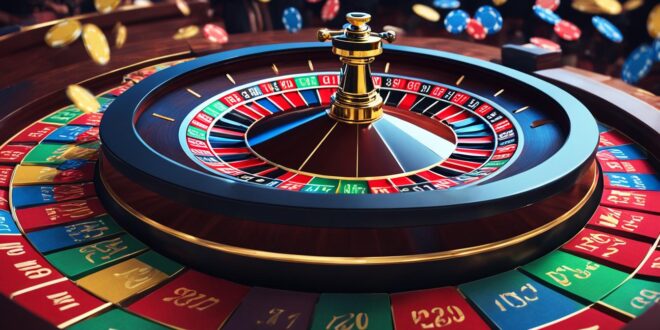The psychology of roulette is a fascinating subject that has been studied in detail. Understanding the psychology of roulette can provide valuable insights for both players and operators. Roulette is one of the most popular casino games, with a recognizable spinning wheel and flashing colors that have become synonymous with the casino experience. The familiarity and worldwide reputation of roulette make it more appealing to players compared to other casino games. The thrill of the unknown and the competitive nature of the game also contribute to its popularity. Additionally, players’ propensity to see patterns and trends in the game, despite the concept of true randomness, adds to the allure of roulette.
Key Takeaways:
- The familiarity and worldwide reputation of roulette contribute to its appeal among players.
- The thrill of uncertainty and the competitive nature of roulette make it popular among players.
- Players are often drawn to the game by their tendency to see patterns and trends, even in situations where true randomness is at play.
- Emotions play a significant role in the psychology of roulette, particularly when it comes to the association between money and feelings.
- Experience, strategies, and the role of luck are all factors that contribute to the enduring popularity of roulette.
The Power of Recognition
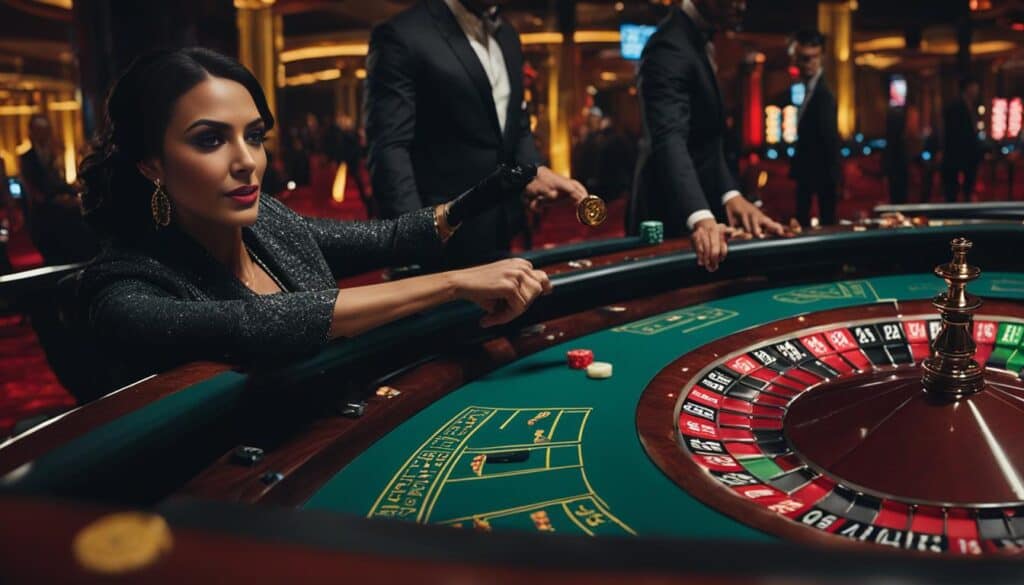
The psychology of casino games shows that familiarity plays a significant role in their appeal. One such game that exemplifies this phenomenon is roulette. Its recognition value should not be underestimated, as humans generally respond more positively to things they are familiar with.
The spinning wheel and the iconic red and black colors of the roulette game have become deeply entrenched in popular culture and the collective psyche. Whether it’s through movies, TV shows, or even personal experiences, these visual elements have gained universal recognition and association with the world of casinos.
This recognition creates a sense of comfort, trust, and excitement for players. When faced with unfamiliar games, players are more likely to choose roulette due to its familiar and recognizable elements. The spinning wheel and its distinct colors evoke a sense of curiosity and anticipation, drawing players in and making the overall casino experience more enticing.
The Familiarity Factor
Humans have a natural inclination toward the familiar. It provides a sense of security and reduces uncertainty. In the context of casinos, familiar games like roulette tap into this psychological preference, offering a sense of comfort and reassurance to players.
“Roulette is like an old friend. You know exactly what to expect when you see that spinning wheel. It’s comforting in a way. You feel like you’re in a familiar and safe environment.” – Casino enthusiast
The power of recognition extends beyond the visual aspect. It encompasses the understanding of the game mechanics, rules, and overall gameplay. Players already familiar with the basics of roulette are more likely to choose it over other unfamiliar casino games, as they can quickly grasp the concept and dive into the excitement without a steep learning curve.
The Allure of the Known
By leveraging the power of recognition, roulette taps into the psychology of casino game players. It offers an appealing and engaging experience by playing on the comfort of the familiar and the excitement of the unknown. The recognition value of roulette enhances its overall appeal and contributes to its enduring popularity among players of all levels.
The Thrill of Uncertainty
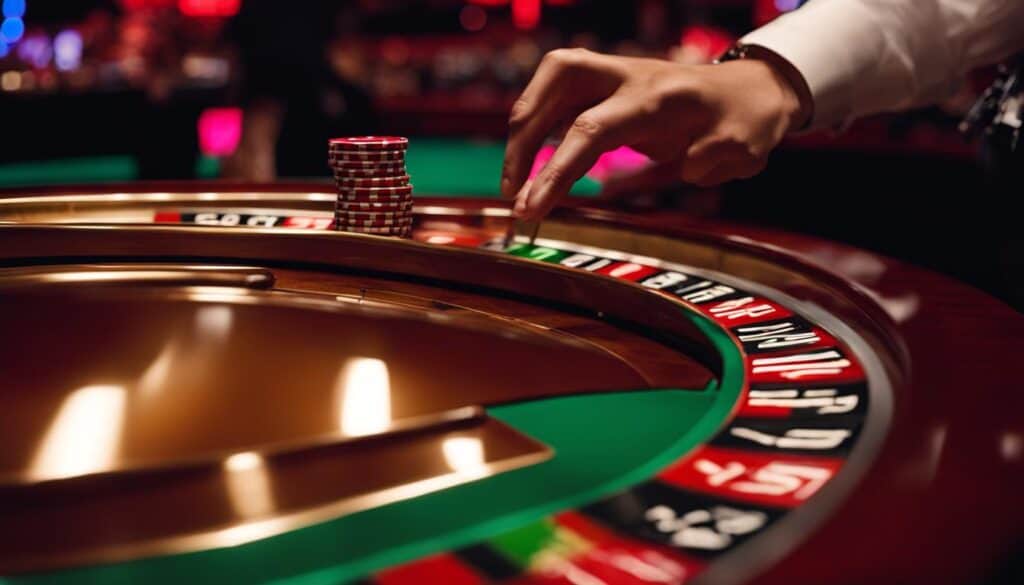
The psychology of roulette is strongly influenced by the thrill of uncertainty. When the ball starts spinning around the wheel, players experience a rush of excitement. The human brain is wired to enjoy activities that have uncertain outcomes, particularly when there is a potential for a rewarding experience. It is this thrill of uncertainty and the possibility of a big win that make roulette such a popular choice among casino players.
Players are drawn to the adrenaline-inducing moments as the ball bounces from one pocket to another, never knowing where it will land. The suspense and anticipation create an electrifying atmosphere that heightens the overall experience of playing roulette. The randomness of the game, combined with the potential for significant gains, keeps players engaged and eager to continue their quest for success.
Unlike other casino games that may rely on skill or strategy, roulette is purely based on chance. Every spin of the wheel presents a fresh opportunity for players to see their fortunes change in an instant. The uncertainty of the outcome adds an element of excitement and unpredictability that is uniquely captivating.
The uncertainty of the roulette wheel is what makes it so enticing. It’s like a rollercoaster ride for the mind, with ups and downs that keep players on the edge of their seats, eagerly awaiting the outcome. It’s this unpredictability that makes roulette a thrilling and exhilarating game to play. – John Smith, Casino Enthusiast
Furthermore, the thrill of uncertainty in roulette also taps into the natural human desire for novelty and exploration. Humans are wired to seek out new experiences and sensations, and roulette provides an avenue for this innate curiosity. Each spin of the wheel is a new adventure, a chance to test one’s luck and potentially discover untold riches.
The thrill of uncertainty in roulette is not only limited to the gameplay itself but also extends to the potential rewards associated with winning. The allure of substantial payouts and the possibility of a life-changing jackpot adds an extra layer of excitement. This anticipation of the unknown outcome, combined with the tantalizing prospect of huge winnings, fuels the psychological appeal of playing roulette.
Next, we will explore the role of competitiveness in gambling and how it influences the psychology of roulette players.
Competitiveness in Gambling
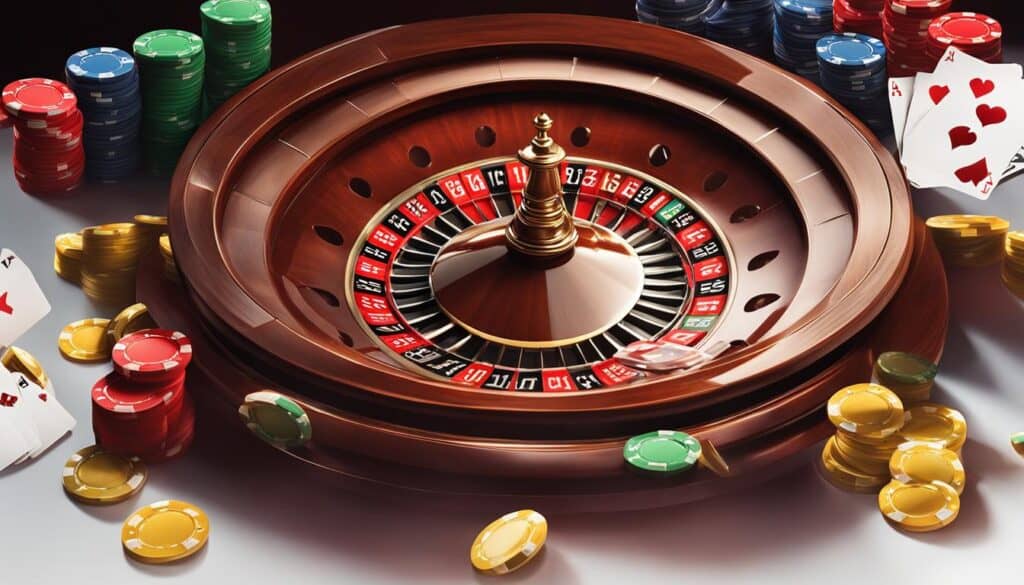
The psychology of roulette is deeply intertwined with the innate competitive nature of humans. Players are driven by a desire to outsmart the house or fellow players at the roulette table. The thrill of overcoming the odds and achieving a victory fuels their engagement with the game. This competitive element taps into the fundamental aspects of human behavior, making gambling, including roulette, a captivating and enduring pastime.
Within the realm of gambling, players are constantly striving for an edge. They are motivated by the prospect of outperforming others and proving their skills and strategies. The pursuit of success becomes an ongoing battle that keeps players coming back to the roulette wheel.
In the world of roulette, where luck and chance play a significant role, the competitive drive takes on a different form. While players recognize that luck ultimately determines the outcome, they still attempt to employ strategies and techniques to tip the scales in their favor. This strategic approach reflects the unwavering competitive spirit that enthusiasts bring to the game.
“In gambling, there is a constant desire to prove oneself, to surpass the odds and emerge victorious. This inherent competitiveness fuels our engagement with roulette and keeps us hooked.” – Casino enthusiast
The psychology of competitiveness in gambling extends beyond individual victory. It also manifests in the communal aspect of casino games. Players compete not only against the house but also against each other, adding another layer of excitement and motivation. The thrill of triumphing over opponents and emerging as the ultimate winner elevates the overall experience of playing roulette.
The behavioral psychology behind the competitiveness in gambling reaches deep into the human psyche. It taps into our primal desire to conquer and emerge triumphant, enticing players to continuously challenge themselves and others. The competitive element in roulette is a core component of its appeal and contributes to its enduring popularity in the world of casino games.
Patterns and Trends
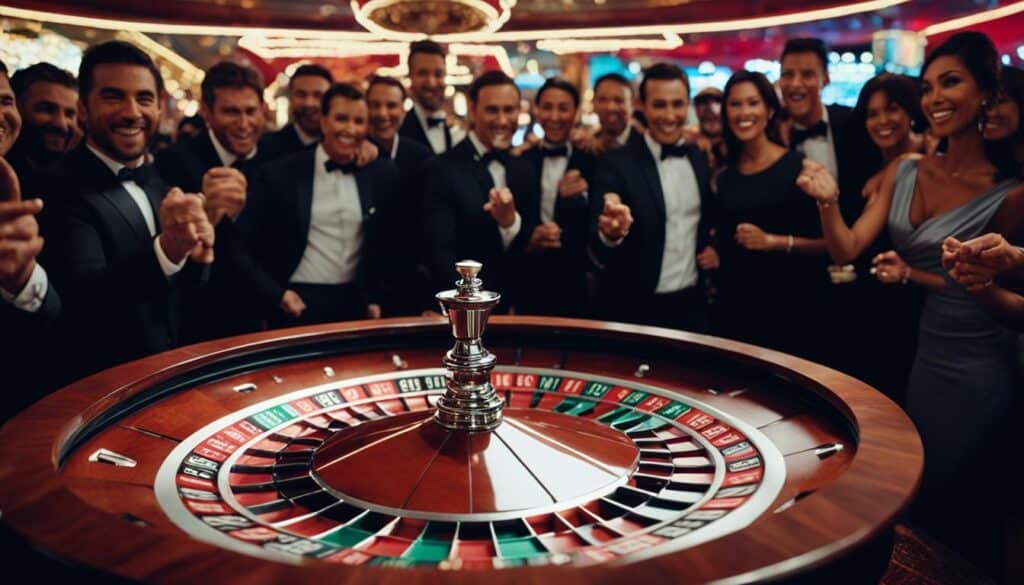
The psychology of roulette is a fascinating subject that delves into the human brain’s affinity for recognizing patterns and trends, even in situations where they may not exist. This innate tendency plays a significant role in the allure of roulette and contributes to its enduring popularity as a casino game.
Players often develop beliefs in lucky numbers or specific systems that they believe give them an edge over the house. These patterns and trends may include betting on certain colors, numbers, or combinations, as well as following betting strategies. However, it is essential to distinguish between genuine patterns and the Gambler’s Fallacy, a psychological quirk that leads people to believe in false patterns.
“The Gambler’s Fallacy is a common cognitive bias in which individuals believe that a past event influences the outcome of a future event, even though the events are statistically independent. In the context of roulette, this fallacy manifests when players erroneously believe that previous outcomes, such as a series of black numbers, increase the likelihood of subsequent outcomes, such as a red number.”
Understanding this aspect of the psychology of roulette is crucial in comprehending why players are drawn to the game and the factors that contribute to its appeal. The allure of recognizing patterns and trends taps into the human brain’s natural inclination to seek order and meaning, providing a sense of control and confidence to players as they navigate the uncertainty of the game.
Psychological Effects and Popularity
The psychological effects of casino games, particularly roulette, further enhance its appeal. The perception of patterns and trends can generate a sense of excitement and anticipation as players try to predict future outcomes. The potential rewards associated with successfully identifying and capitalizing on these patterns add to the thrill and allure of roulette.
Furthermore, the psychological satisfaction that players derive from spotting patterns and trends can contribute to a positive emotional experience, enhancing their overall enjoyment of the game. The feeling of being able to decipher and predict outcomes can create a sense of mastery and accomplishment that keeps players engaged and coming back for more.
Overall, the psychology of roulette, with its inherent connection to patterns and trends, offers valuable insights into the factors that contribute to its enduring popularity. By understanding the human brain’s innate propensity for recognizing patterns and the appeal it holds for players, we can gain a deeper appreciation of the allure and excitement that roulette offers as a casino game.
Emotions and Money
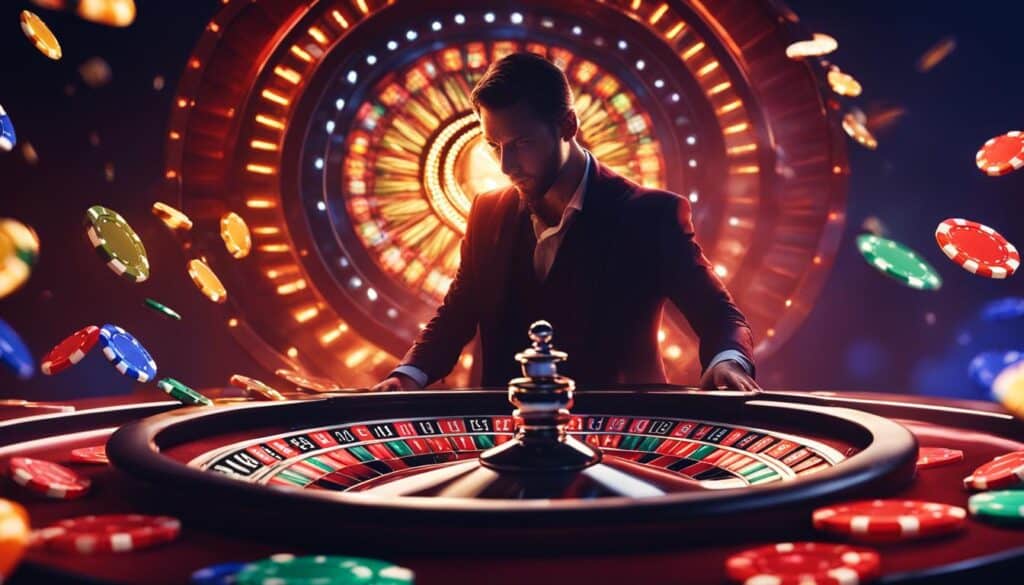
The psychology of roulette is deeply intertwined with emotions, particularly the strong connection between money and feelings. When players engage in a game of roulette, the potential for winning or losing money can evoke a wide range of emotions. The surge of adrenaline and excitement that comes with a winning bet can create a sense of euphoria and triumph. On the other hand, experiencing losses can lead to feelings of sadness, frustration, or even anger.
It’s essential for roulette players to manage their emotions effectively and not let them cloud their judgment. Emotional control is crucial to making rational decisions and strategic bets. The ability to stay calm and composed, regardless of the outcome, is a key mindset for successful roulette players.
Emotions can significantly influence the behavior and mindset of roulette players. For some, the thrill of winning money can be addictive, leading to a continuous chase for that exhilarating high. This can result in impulsive and risky betting behavior, as players seek to replicate the same emotional rush they experienced before.
“The association between money and emotions in roulette can be a double-edged sword. While winning can create a sense of satisfaction and confidence, it’s important to remember that losses are also part of the game. Keeping emotions in check allows players to make rational decisions and maintain a healthy approach to gambling.”
Recognizing and understanding the psychological effects of money in roulette is crucial for both players and operators. By acknowledging the emotional component, players can develop strategies to manage their reactions and minimize the negative impact of losses. Operators, on the other hand, can use this understanding to create responsible gambling environments and provide support for players who may be struggling with their emotions.
The emotional aspect adds a layer of complexity to the psychology of roulette and enhances the overall experience for players. It is the interplay between emotions and money that contributes to the game’s allure and keeps players coming back for more.
The Power of the Wheel
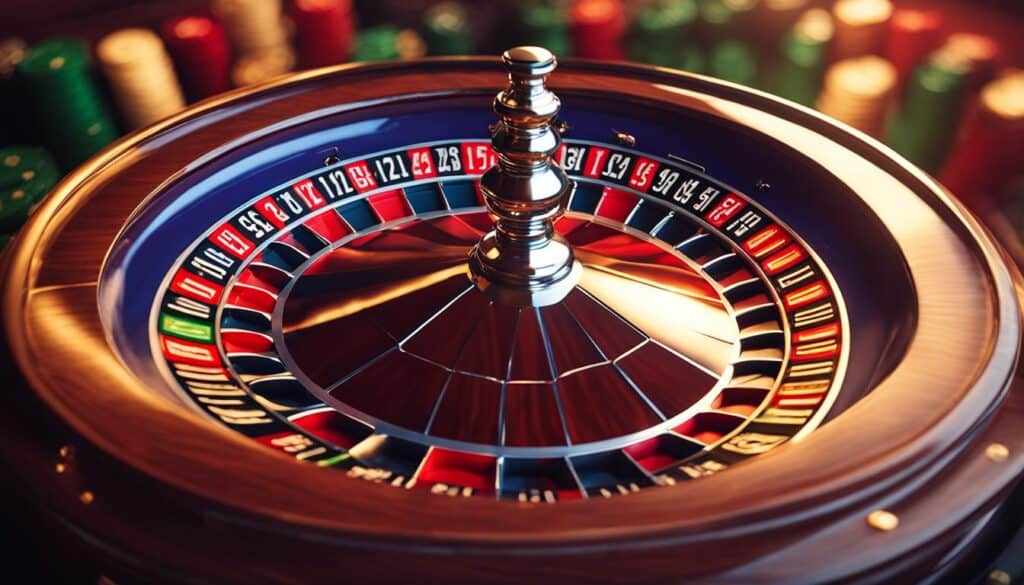
The roulette wheel holds a captivating power that significantly contributes to the appeal and popularity of the game. With its striking black and red colors and its frequent appearance in casino scenes in movies and TV shows, the roulette wheel has become iconic and alluring. Its worldwide recognition draws players in, creating a strong association with the thrill of the casino experience. The power and symbolism of the roulette wheel play a crucial role in understanding the psychology of casino games and the magnetic appeal of roulette.
When players see the roulette wheel, they are immediately transported into the exciting world of gambling. The spinning wheel evokes anticipation and excitement, as players eagerly anticipate where the ball will ultimately land. The visual spectacle of the wheel, combined with the potential for big wins, holds a unique allure that keeps players coming back for more.
The roulette wheel’s centrality to the game, both physically and conceptually, cannot be overstated. It serves as a visual and tangible representation of the dynamic nature of roulette, where luck and chance are in constant motion. With every spin, players experience a rush of adrenaline as they hope for a favorable outcome.
The Role of Strategy
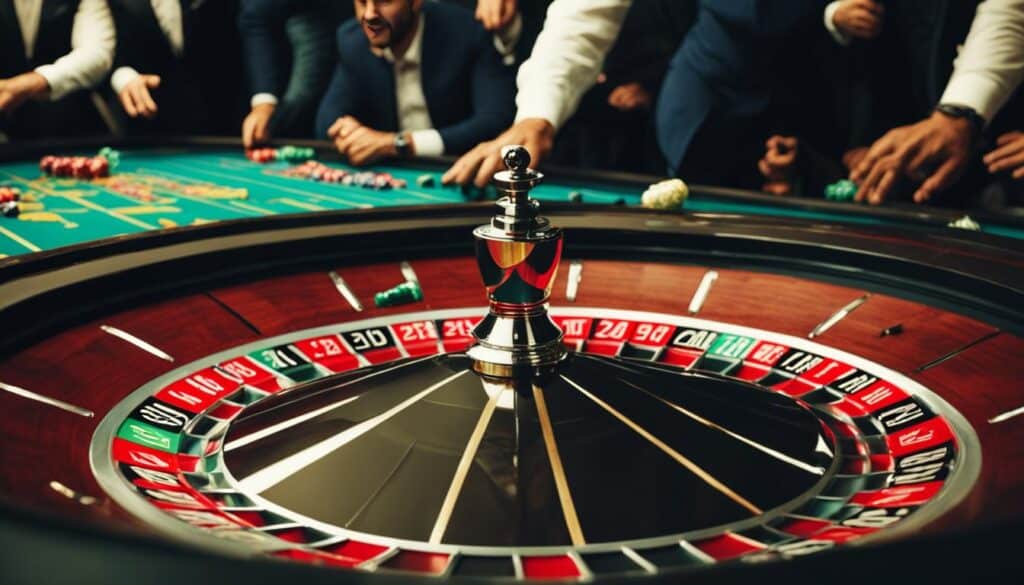
While roulette is primarily a game of chance, the psychology of roulette also places importance on strategies employed by players. Many individuals engage in various tactics and systems, firmly believing that they give them an edge in the game. Implementing strategies is an integral part of the psychological aspect of roulette, as it allows players to feel more in control and potentially increase their chances of winning. However, it is essential to note that roulette remains a game of chance, and no strategy can guarantee consistent wins.
Players often adopt different strategies when playing roulette, such as the Martingale system or the Fibonacci sequence. These strategies involve placing bets in a certain pattern or adjusting bet sizes based on previous outcomes. The underlying psychology behind these strategies is the desire to influence the outcome of the game and reduce the element of chance.
It is important to mention that while strategies can provide a certain level of structure and organization to the game, they do not change the fundamental nature of roulette as a game of luck. The outcome of each spin is independent and random, unaffected by previous results or any specific strategy employed.
The allure of utilizing strategies in roulette comes from the psychological need to feel in control and increase the sense of agency. For some players, having a strategy gives them a perceived advantage and bolsters their confidence in making bets. This psychological boost can enhance the overall enjoyment and engagement with the game.
The Role of Experience
Experience plays a crucial role in the psychology of casino games, including the popular game of roulette. Over time, players develop their own preferences, lucky numbers, or personalized systems that they believe can give them an edge when playing. This accumulation of experience shapes their mindset and influences their behavior at the roulette table. By understanding the role of experience, we can better grasp the factors that contribute to the widespread popularity of roulette among different players.
The Influence of Technology
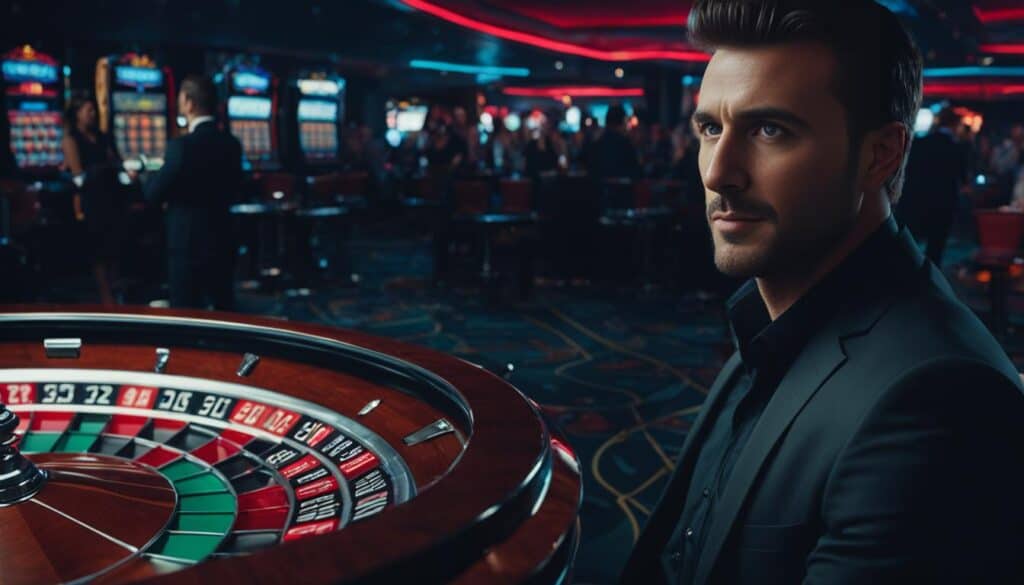
The psychology of casino games, such as roulette, is greatly influenced by the advancements in technology. The availability of online roulette and mobile gaming has revolutionized the way players engage with the game. The convenience and accessibility offered by these platforms have contributed to the appeal of roulette and other casino games.
Online roulette provides a realistic and immersive experience for players, allowing them to enjoy the thrill of the game from the comfort of their own homes. The integration of cutting-edge technology, such as high-quality graphics and interactive features, enhances the overall gaming experience and taps into the psychology of players.
In recent years, there has also been a trend towards virtual reality (VR) in the world of online gaming. Virtual reality roulette takes the immersion to a whole new level, allowing players to feel as if they are physically present in a casino. The visual and auditory stimuli provided by VR technology further enhance the appeal and engagement levels of roulette players.
The influence of technology goes beyond the presentation and accessibility of the game. Online platforms also offer various features that cater to the psychology of players. These features include personalized user interfaces, advanced analytics, and social interaction elements that tap into the innate human need for socialization and competition.
The integration of technology into roulette and other casino games has had a profound impact on human behavior. It has not only expanded the reach of these games but also altered the way players perceive and interact with them. With the continuous advancement of technology, the psychology of roulette is likely to evolve further, creating new opportunities for players and operators alike.
The Role of Luck
Luck plays a crucial role in the psychology of roulette. The element of chance and the reliance on luck are significant drivers for players, contributing to the game’s enduring popularity and appeal. Players are motivated by the desire to experience the generosity of Lady Luck or the fickle hand of fate, keeping them engaged and hopeful for that big win.
The psychology of luck goes beyond mere chance; it is deeply intertwined with the psychology of roulette itself. The thrill of relying on luck adds an extra layer of excitement to the game, heightening players’ anticipation and sense of wonder. Whether it’s believing in lucky numbers or trusting in a personal system, players are driven by the hope that luck will be on their side.
The Simplicity of Roulette
The simplicity of roulette is a crucial factor in its popularity. Unlike many other table games, roulette is easy to understand and play. Novice players can quickly grasp the gameplay and join in the excitement of a live game on the green baize. The straightforward nature of roulette, where players can simply bet on red or black, enhances its appeal and makes it accessible to a wide range of players.
The Fascination Beyond the Game
The psychology of roulette goes beyond the game itself. For many players, roulette is more than just a game; it represents an experience, a thrill, and a challenge. The allure of roulette lies in the excitement, uncertainty, and potential rewards it offers. This fascination with the game goes hand in hand with the psychology of players and their deep-rooted desire to win.
FAQ
What is the psychology behind roulette’s popularity?
The psychology of roulette is multifaceted, with factors such as recognition, uncertainty, competitiveness, patterns, and emotions all playing a role in its appeal to players.
Why is recognition important in the psychology of roulette?
The familiarity and worldwide reputation of roulette, with its spinning wheel and red and black colors, make it more appealing to players compared to other casino games.
What role does uncertainty play in the psychology of roulette?
The thrill of the unknown and the competitive nature of the game create a sense of excitement for players, contributing to its popularity.
How does competitiveness affect the psychology of roulette?
The inherent competitive nature of humans drives players to seek to beat the house or other players at the table, adding to the allure of roulette.
Do patterns and trends influence the psychology of roulette?
Players’ tendency to see patterns and trends, despite the concept of true randomness, contributes to the allure of roulette. However, it is important to distinguish genuine patterns from the Gambler’s Fallacy.
How do emotions and money influence the psychology of roulette?
Winning or losing money in roulette can evoke a range of emotions, adding an emotional element to the game that influences players’ behavior and mindset.
What is the power of the roulette wheel in the psychology of roulette?
The recognition value and symbolism of the roulette wheel, along with its association with casino experiences in popular culture, contribute to the game’s appeal and popularity.
Does strategy play a role in the psychology of roulette?
Players may engage in various tactics and systems in roulette, believing it gives them an edge. However, it is important to note that roulette remains a game of chance, and no strategy guarantees consistent wins.
How does experience influence the psychology of roulette?
Players’ preferences, lucky numbers, or past outcomes can shape their mindset and behavior when playing roulette, based on their experience with the game.
How has technology impacted the psychology of roulette?
The availability of online roulette and advancements in technology, such as virtual reality, have made the game more accessible and immersive, enhancing players’ engagement.
What is the role of luck in the psychology of roulette?
The element of chance and the desire to experience luck’s generosity or fickle nature contribute to the enduring popularity of roulette among players.
Why is the simplicity of roulette important in its psychology?
The straightforward nature of roulette, where players can simply bet on red or black, makes it easy to understand and accessible to a wide range of players.
What fascinates players beyond the game in the psychology of roulette?
For many players, roulette represents an experience, thrill, and challenge that goes beyond just a game. The allure lies in the excitement, uncertainty, and potential rewards it offers.
 Online Gaming Circuit
Online Gaming Circuit
